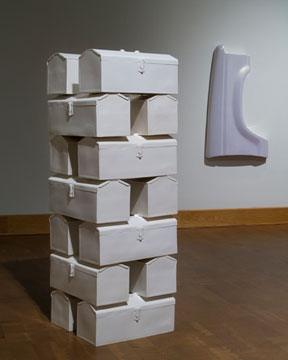 On Monday, March 17, 2008, Visiting Art Professor Joseph Gower opened his art exhibit entitled "Shop" to the Wabash community in the Eric Dean Gallery inside the Fine Arts Center. A multitude of students and faculty alike arrived to experience the young professor’s work firsthand.
On Monday, March 17, 2008, Visiting Art Professor Joseph Gower opened his art exhibit entitled "Shop" to the Wabash community in the Eric Dean Gallery inside the Fine Arts Center. A multitude of students and faculty alike arrived to experience the young professor’s work firsthand.
In "Shop", Gower took normal everyday objects that have a masculine connotation to their name and transformed them into art. He has taken these objects and created a ceramic cast of them, turning what was once functional into art that is purely aesthetic. The primary objects used in the exhibit were in fact parts of vintage and contemporary cars. One piece was a reinforced ceramic cast of a Ford F-150’s bumper painted in an impressive transition of colors. Upon first gaze, the piece appears to be off white; however as the careful observer will notice, the piece when viewed from different angles turns a pale shade of green – and when the gallery light hits it just so, a brilliant shade of purple resonates.
The feminine colors used in these pieces – the purples, pinks, pastel greens and blues – were a striking contrast to the fiercely masculine objects they adorned. Many observers noticed the salient characteristic as well. IT Desktop Support Analyst Macie Rudoff, commenting on the counterintuitive message presented by the exhibit, said, "I really like the juxtaposition of the masculine and feminine themes. I think he does a really good job taking things out of the male context, and it would actually be a pretty good dialogue for Wabash. He turns it around with just a coat of paint."
Professor Cherry of the theater department was also deeply impressed with the unique approach to masculinity that Gower took with this exhibit. "It toys with traditional masculine images," Cherry said, "and allows you to talk about things that are traditionally associated with machismo and sort of toys and remakes traditional images and architects."
"My main intention is to provide a bridge," Gower said, "to bring in the working class people who aren’t familiar with art or abstract objects and give them something that they immediately have a reaction to. At the same time, it is questioning sexuality and masculinity, so I’m really bringing together two cultural gaps."
"I’d say that a lot of my work," Gower said, "is influenced by minimalists like Donald Judd and Carl Andre, who used steel during the ‘50s and ‘60s. They were heavy, masculine artists - you know, real guys’ guys. You know, drink beer and make art. I’m referencing a lot of work in it, but it’s ceramic, it’s fragile. There are traditional feminine materials, but there is a direct reference to those minimalists."
Finally, Professor Gower expressed how he personally relates to this exhibit.
"I grew up from a working class background, working with my dad repairing cars, so there is that identifiability of any guy and that sexuality driven to a car," Gower said. "This work is sort of like a self-portrait because it is who I am. It is me making honest work."
"Shop" is truly something to be experienced firsthand, for it is, as Professor Cherry stated, "unique and of this place, of this community."